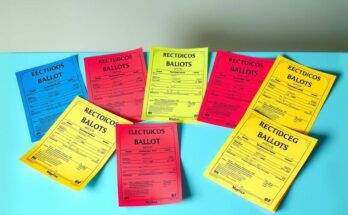The Argentine diplomatic residence in Caracas, sheltering five Venezuelan opposition members, has been deemed a “prison” by adviser Magalli Meda due to prolonged power outages. These members seek refuge from arrest warrants issued in March amidst political turmoil following disputed presidential elections. Diplomatic relations with Argentina are strained following an incident involving an Argentine security officer in Venezuela.
The Argentine diplomatic residence in Caracas, which currently shelters five Venezuelan opposition members seeking refuge from arrest, has been characterized as a “prison” by Magalli Meda, an adviser to opposition leader Maria Corina Machado. According to Ms. Meda, the residence has endured power outages for over a month, affecting their living conditions. The Venezuelan government contends that this lack of electricity is due to the residence’s failure to pay its utility bills. The opposition figures have been residing there since March when arrest warrants were issued against them.
In the wake of disputed presidential elections in July, where both President Nicolas Maduro and opposition candidate Edmundo Gonzalez claimed electoral victories, tensions have escalated. While the opposition has detailed vote counts supporting their claims, President Maduro has remained silent on the matter. Following these elections, Mr. Gonzalez fled to Spain, and Ms. Machado, who was barred from participating, remains in hiding. Argentina and Peru have publicly supported the opposition’s claims, straining their diplomatic relations with the Maduro administration, while Brazil has assumed the responsibility for managing embassy operations for both nations in Venezuela.
Ms. Meda voiced concern over the lack of diplomatic intervention, stating, “No ambassador has come to this embassy. Not one. Have they tried? Surely some would have wanted to.” Concurrently, a diplomatic dispute has arisen between Venezuela and Argentina, sparked by the arrest of an Argentine security officer in Venezuela. The Argentine authorities maintain that the individual traveled to Venezuela for familial reasons, whereas the Maduro administration has alleged his involvement in a conspiracy against the government.
The situation surrounding the Venezuelan opposition reflects a broader context of political strife within the country. The Venezuelan government, led by President Nicolas Maduro, has been accused of authoritarian practices, including the suppression of dissent and manipulation of electoral processes. The arrests of opposition figures are indicative of the risks faced by political adversaries in Venezuela, particularly following the controversial July elections that further polarized the political landscape. The diplomatic tensions involving Argentina highlight the international ramifications of Venezuela’s internal conflicts, as nations choose sides in support of opposing factions.
In summary, the Argentine residence in Caracas, where Venezuelan opposition members are currently seeking refuge, is facing dire conditions, including power shortages. The political climate in Venezuela remains tumultuous with disputed election results, diplomatic tensions, and the ongoing struggle of opposition leaders to navigate a repressive regime. These developments underline the urgency for international diplomatic engagement and support for human rights in Venezuela.
Original Source: www.newsmax.com




